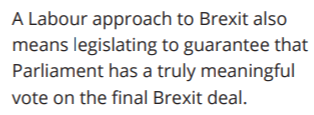The starting point is Article 50. It states:
3. The Treaties shall cease to apply to the State in question from the date of entry into force of the withdrawal agreement or, failing that, two years after the notification referred to in paragraph 2, unless the European Council, in agreement with the Member State concerned, unanimously decides to extend this period.
So, as a matter of EU law, we leave when a withdrawal agreement says we do or, if there is no withdrawal agreement, two years from the notification.
So walking out of negotiations before the two years are up does not, as a matter of EU law, terminate our EU membership.
What about as a matter of UK law?
Our membership of the EU flows from the European Communities Act 1972. As a matter of UK law we are in the EU so long as that Act says we are.
And what’s key here is who controls the status of that Act.
If the status of the 1972 Act is in Parliament’s hands then it will be for Parliament to choose, should our talks with the EU break down, how to respond. Parliament may choose to react by repealing the European Communities Act 1972 or it may choose some other action.
It is difficult to imagine how Parliament could demand that the PM restart negotiations. But leaving with no deal will have calamitous consequences and, in a world where Brexit had fallen so very far short of the promised cake-and-eat-it uplands, Parliament could well think it right for the electorate to decide whether to leave the EU without a deal or to Remain. And if a Referendum produced a Remain result before 29 March 2019, and the EU consented, we would Remain in the EU as a matter of both UK and EU law.
But the important thing is that the question ‘what action should we take if the talks break down?’ would be for Parliament to answer.
But what if the status of the 1972 Act was outside Parliament’s hands?
That’s a topical question because Parliament is just about to be asked to agree to repeal the 1972 Act in the European Union (Withdrawal) Bill.
The very first clause of that Bill says:
The European Communities Act 1972 is repealed on exit day.
And “exit day” is defined as “such day as a Minister of the Crown may by regulations appoint.”
Yep, that’s right. The government is proposing that a Minister gets to decide when our membership of the EU ends. And to make that decision without any Parliamentary control at all. None, zip, nada.
The consequence of Parliament agreeing to this clause is stark.
If talks do break down, it will be a Minister of the Crown – Boris Johnson, say – who has absolute unfettered discretion as to how to react. Parliament – our sovereign and democratically elected Parliament – will be completely sidelined from the most important decision our nation has made in recent times.
Giving unfettered power to a Minister, marginalising our Parliament, in respect of such an important decision is the very opposite of taking back control.
Parliament must vote against clause one.



You must be logged in to post a comment.